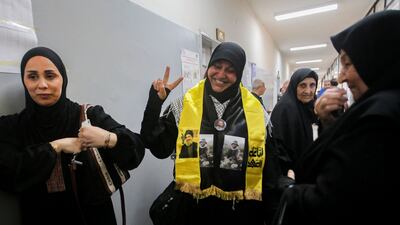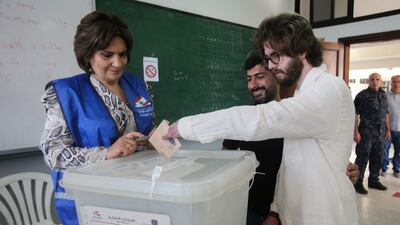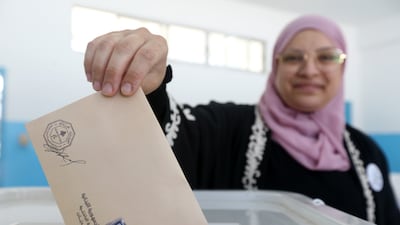Lebanon recently finished the last round of its municipal elections, and the message was not reassuring. Lists backed by the country’s sectarian political parties were largely victorious. This anticipates a period of continued polarisation at a time when Lebanon needs to be unified around a project to benefit from the changing dynamics in the Middle East.
Writing in the US-based International Policy Digest, Mohammad Fheili, executive in residence at the American University of Beirut, expressed a more general mood in Lebanon about where the country was going. Commenting on US President Donald Trump’s recent tour of the Middle East, Mr Fheili noted that “Lebanon [was] conspicuously absent from the conversation. Lebanon wasn’t simply left off the agenda. It seems to have vanished from it altogether”.
The mood among leading parties inside Lebanon seems blithely detached from the broader shifts in the region. The main Christian political party, the Lebanese Forces, took pride in its victories in the towns of Jounieh and Zahleh, while doing well in other Christian bastions. For the party’s leader, Samir Geagea, this bodes well for parliamentary elections next year, when the Lebanese Forces hope to form an even larger bloc than the one they have today.
Of particular urgency for Mr Geagea is not only to marginalise the Free Patriotic Movement led by Gebran Bassil, but also to push back against any potential electoral challenge by candidates supported by President Joseph Aoun, whom Mr Geagea quietly regards as a rival.
Candidates backed by Hezbollah and the allied Amal Movement did well in the south and in the Baalbek-Hermel regions, but that was expected. Following the recent military defeat of Hezbollah by Israel, it was not likely that voters would oppose the party, displaying divisions that would only compound the Shiite community’s setbacks because of the war.
Similarly, in other areas, candidates backed by the political class did well. This was less visible in the Sunni community, given that Saad Hariri, once the dominant communal representative, failed to engage with the elections. However, renewed Saudi interest in Lebanon, albeit limited, and the downfall of the Assad government in Syria have helped revive a community that had often felt sidelined during the years of Hezbollah’s hegemony.
Yet if the elections were largely interpreted in domestic political terms by the sectarian political parties, Mr Fheili’s doubts were reaffirmed when it comes to the region. A fragmented country, led by self-interested political parties focused on short-term gains to secure communal ascendancy, is hardly one optimally prepared for regional transformations.
There may be exceptions to this. As my colleague Maha Yahya of Carnegie has noted, Mr Trump’s decision to lift sanctions on Syria may have positive repercussions on Lebanon’s banking lobby, which has systematically blocked financial reforms, fearing that banks may be forced to bear the greatest burden of losses from the financial collapse of 2019-2020.
Today, if reconstruction resumes in Syria, Lebanon’s banking sector anticipates playing a major role in the process. However, this can happen only if it agrees to a restructuring, allowing banks to refloat themselves. Until now, there has been resistance in the sector, both because there has been no agreement over who – banks, the state, or the central bank – would cover the largest share of losses and because restructuring may eliminate several banks.
The reality is that many nations appear to have lost patience with Lebanon, which over the years has thwarted numerous efforts to reform its economy. The country is a graveyard for new approaches, as it remains under the thumb of political, financial and commercial cartels that unfailingly shoot down most ideas aiming to break a debilitating stalemate.
Yet the message in Mr Trump’s visit to the region was fairly evident. He seeks a world in which economic relations and self-interest prevail, but also, it seems, one in which China, Russia and the US have their spheres of influence. If that’s his vision, the Middle East will remain an area of competition between the US and China, which implies that the countries of the region have much to gain by positioning themselves between rival superpowers.
Yet Lebanon, once the quintessential middle-man country, is devoid of ideas, and is struggling with a geopolitical situation that is catastrophic. Israel’s regional strategy has shifted to one of enhancing its security by fragmenting its Arab neighbours, and acting, or planning to act, with impunity inside their territories. This could be fatal for Lebanon.
In light of this, Lebanon must press forward in its dialogue with Hezbollah to secure the group’s disarmament. Only then will it be able to free the south of Israel’s occupation and normalise the situation enough to think strategically about its regional place. This would reassure outside countries that it is progressing enough for them to provide vital foreign investment.
But even that may not be enough if Lebanon doesn’t overcome its incapacitating sectarian factionalism. Unless this happens and the Lebanese come together to shape a common vision for the future, the country will remain an afterthought – a place bleeding its youth to the advantage of more vibrant societies. Like a dried flower, it will be both beautiful and dead.
Mohammed bin Zayed Majlis
Huroob Ezterari
Director: Ahmed Moussa
Starring: Ahmed El Sakka, Amir Karara, Ghada Adel and Moustafa Mohammed
Three stars
THE BIO
Favourite place to go to in the UAE: The desert sand dunes, just after some rain
Who inspires you: Anybody with new and smart ideas, challenging questions, an open mind and a positive attitude
Where would you like to retire: Most probably in my home country, Hungary, but with frequent returns to the UAE
Favorite book: A book by Transilvanian author, Albert Wass, entitled ‘Sword and Reap’ (Kard es Kasza) - not really known internationally
Favourite subjects in school: Mathematics and science
Dr Afridi's warning signs of digital addiction
Spending an excessive amount of time on the phone.
Neglecting personal, social, or academic responsibilities.
Losing interest in other activities or hobbies that were once enjoyed.
Having withdrawal symptoms like feeling anxious, restless, or upset when the technology is not available.
Experiencing sleep disturbances or changes in sleep patterns.
What are the guidelines?
Under 18 months: Avoid screen time altogether, except for video chatting with family.
Aged 18-24 months: If screens are introduced, it should be high-quality content watched with a caregiver to help the child understand what they are seeing.
Aged 2-5 years: Limit to one-hour per day of high-quality programming, with co-viewing whenever possible.
Aged 6-12 years: Set consistent limits on screen time to ensure it does not interfere with sleep, physical activity, or social interactions.
Teenagers: Encourage a balanced approach – screens should not replace sleep, exercise, or face-to-face socialisation.
Source: American Paediatric Association
Who was Alfred Nobel?
The Nobel Prize was created by wealthy Swedish chemist and entrepreneur Alfred Nobel.
- In his will he dictated that the bulk of his estate should be used to fund "prizes to those who, during the preceding year, have conferred the greatest benefit to humankind".
- Nobel is best known as the inventor of dynamite, but also wrote poetry and drama and could speak Russian, French, English and German by the age of 17. The five original prize categories reflect the interests closest to his heart.
- Nobel died in 1896 but it took until 1901, following a legal battle over his will, before the first prizes were awarded.
What are the influencer academy modules?
- Mastery of audio-visual content creation.
- Cinematography, shots and movement.
- All aspects of post-production.
- Emerging technologies and VFX with AI and CGI.
- Understanding of marketing objectives and audience engagement.
- Tourism industry knowledge.
- Professional ethics.
Evacuations to France hit by controversy
- Over 500 Gazans have been evacuated to France since November 2023
- Evacuations were paused after a student already in France posted anti-Semitic content and was subsequently expelled to Qatar
- The Foreign Ministry launched a review to determine how authorities failed to detect the posts before her entry
- Artists and researchers fall under a programme called Pause that began in 2017
- It has benefited more than 700 people from 44 countries, including Syria, Turkey, Iran, and Sudan
- Since the start of the Gaza war, it has also included 45 Gazan beneficiaries
- Unlike students, they are allowed to bring their families to France
GAC GS8 Specs
Engine: 2.0-litre 4cyl turbo
Power: 248hp at 5,200rpm
Torque: 400Nm at 1,750-4,000rpm
Transmission: 8-speed auto
Fuel consumption: 9.1L/100km
On sale: Now
Price: From Dh149,900
The specs
- Engine: 3.9-litre twin-turbo V8
- Power: 640hp
- Torque: 760nm
- On sale: 2026
- Price: Not announced yet
Community Shield info
Where, when and at what time Wembley Stadium in London on Sunday at 5pm (UAE time)
Arsenal line up (3-4-2-1) Petr Cech; Rob Holding, Per Mertesacker, Nacho Monreal; Hector Bellerin, Mohamed Elneny, Granit Xhaka, Alex Oxlade-Chamberlain; Alex Iwobi, Danny Welbeck; Alexandre Lacazette
Arsenal manager Arsene Wenger
Chelsea line up (3-4-2-1) Thibaut Courtois; Cesar Azpilicueta, David Luiz, Gary Cahill; Victor Moses, Cesc Fabregas, N'Golo Kante, Marcos Alonso; Willian, Pedro; Michy Batshuayi
Chelsea manager Antonio Conte
Referee Bobby Madley
IPL 2018 FINAL
Sunrisers Hyderabad 178-6 (20 ovs)
Chennai Super Kings 181-2 (18.3 ovs)
Chennai win by eight wickets
Tamkeen's offering
- Option 1: 70% in year 1, 50% in year 2, 30% in year 3
- Option 2: 50% across three years
- Option 3: 30% across five years
How to come clean about financial infidelity
- Be honest and transparent: It is always better to own up than be found out. Tell your partner everything they want to know. Show remorse. Inform them of the extent of the situation so they know what they are dealing with.
- Work on yourself: Be honest with yourself and your partner and figure out why you did it. Don’t be ashamed to ask for professional help.
- Give it time: Like any breach of trust, it requires time to rebuild. So be consistent, communicate often and be patient with your partner and yourself.
- Discuss your financial situation regularly: Ensure your spouse is involved in financial matters and decisions. Your ability to consistently follow through with what you say you are going to do when it comes to money can make all the difference in your partner’s willingness to trust you again.
- Work on a plan to resolve the problem together: If there is a lot of debt, for example, create a budget and financial plan together and ensure your partner is fully informed, involved and supported.
Carol Glynn, founder of Conscious Finance Coaching













